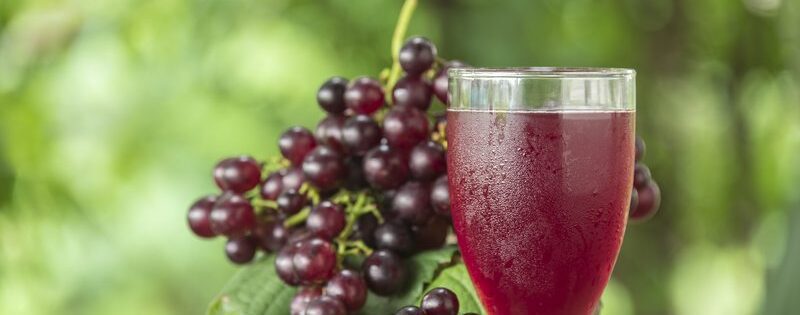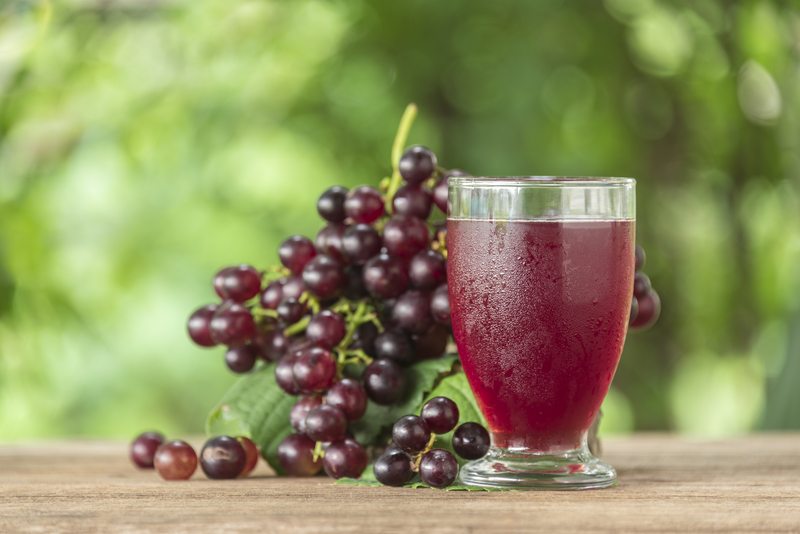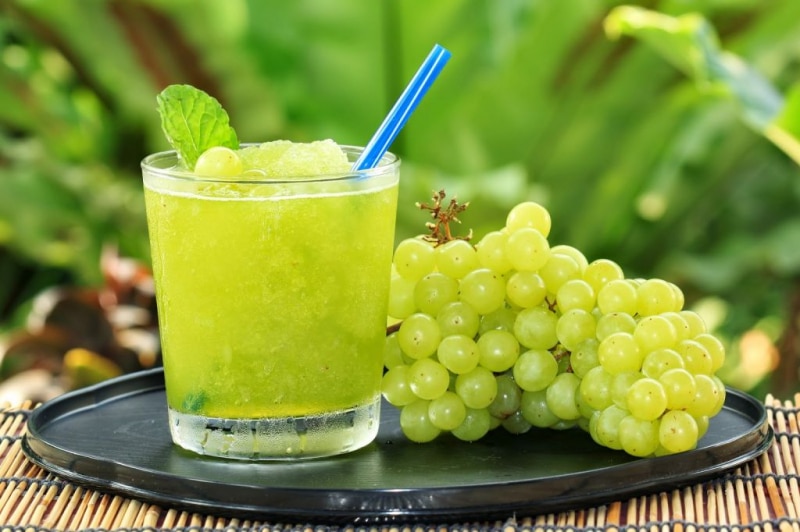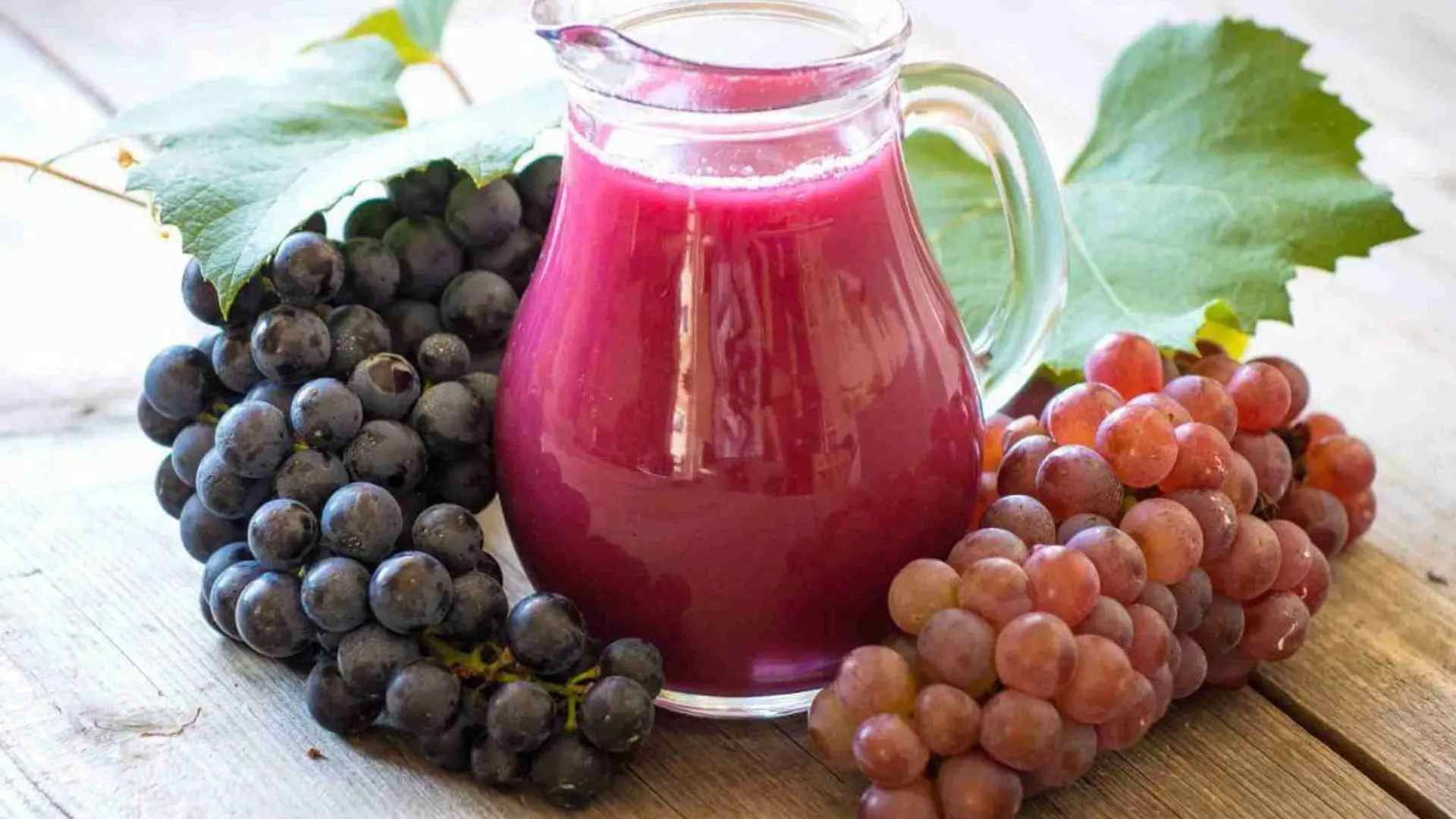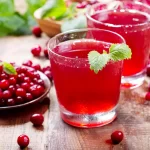Grapes are a popular fruit around the world with all colors green, purple, red, black; to varieties with or without seeds… Mentioning grapes, people will immediately think of wine or raisins – two outstanding products of this interesting bunch. What about fresh grape juice? What is grape juice good for? Read this article for more information!
Have you known about Grape Juice?
From the fresh Grapes
Grapes belong to the succulent family (81%) and grow in attractive bunches. A cup of red or green grape juice weighing 100g contains about 104 mg of Potassium, 18mg of Ca, 180g of Fiber and many vitamins (B1, B2, B6, C, K)…
In addition, grapes contain a large amount of natural sugar (especially in the dark varieties) making them ideal for making delicious juices.
What’s the difference between black grapes, red grapes, and green grapes?
The color of each grape gives a different taste experience. To say which variety is best is a personal choice: Green grapes are usually sour (sometimes slightly acrid), while the darker the color, the sweeter the fruit. However, each flavor is worth a try.
In terms of nutrition, the three types are evaluated to be equivalent in content. However, the concentration of flavonoids – substances that fight chronic diseases, will cause red and even more black. Maybe that’s why many people prefer to use black grapes.
Do we need to remove the seeds?
Unlike mango seeds, jackfruit seeds … to remove grape seeds will be very laborious and time consuming. And we should not throw it away, when this is the main source of nutrients of grapes, extremely nutritious for health such as preventing the risk of cancer, cardiovascular …
Using grape seeds will help you lose more weight with the ability to accelerate metabolism and inhibit, reduce the level of fat absorption in the body.
What is grape juice good for?
Grapes contain many antioxidants
Natural phytochemicals like Resveratrol and Quercetin, Procyanidins, Tannins and Saponins are a few antioxidants known to protect your heart health. According to research, grape juice has the same healing effects as grapes.
Red and purple grape juice reduces platelet stickiness (platelet aggregation), which is a major factor in blood clotting.
Grape juice also increases good cholesterol (HDL) levels. It reduces inflammation in blood vessels and improves resilience (vasodilation and healing).
Control blood sugar and diabetes
One of the major contributing factors to diabetes is oxidative stress. Drinking grape juice can reduce insulin resistance. It contains Anthocyanin, Proanthocyanidin, Flavonol, Phenolic Acid and Resveratrol, which are powerful antioxidants.
They scavenge free radicals that oxidize and inflame the insulin-secreting pancreatic cells. Grape polyphenols improve impaired glucose tolerance in tissues. This is thought to be the early stages of diabetes.
Possesses anti-cancer properties
Drinking purple grape juice can inhibit DNA damage and this can lead to cancer.
A study done in Korea showed the effect of daily grape consumption on DNA. Healthy participants had reduced levels of oxidative DNA damage in immune system cells. In addition, grape juice increases the antioxidant capacity of the blood plasma.
Phytochemicals were found to be effective in killing colon cancer cells. How they select and grow on cancer cells is still being studied. However, there was a decrease in the incidence of tumors in mice fed with grape extract.
Giving patients grape juice rich in flavonoids can control chemotherapy-induced nausea, vomiting, and other side effects. The results of these studies turned out to be inconclusive. But with more supporting data, drinks like grape juice could be seen as a cheaper alternative to chemotherapy therapies.
Promotes gut and digestive health
Adding grapes to your diet with high-fat foods drastically changes your gut microbial environment. Despite their limited absorption and digestion, Polyphenols present in grapes protect your gut against pathogens, oxidative stress and inflammation.
A blend of grape juice and red wine or just grape polyphenols in the diet controls weight gain and glucose intolerance. These natural chemicals also reduce intestinal inflammation by inhibiting the production of inflammatory markers (TNF-α, IL-6, Lipopolysaccharide, etc.).
Grape polyphenols also enhance the integrity of the intestinal barrier. They promote the growth of helpful gut bacteria like Akkermansia muciniphila. This can enhance digestion and assimilation.
Protect and nourish your skin
Red wine, grape juice, cranberries, peanuts, and products thereof – all of which are similar in that they contain resveratrol. Resveratrol has anti-inflammatory effects due to its action as an antioxidant and anti-mutagenic.
Resveratrol inhibits tumorigenesis (tumor formation) when administered to rat skin cancer models. Multiple studies in rats demonstrate the photoprotective properties of this grape phytochemical.
Topical resveratrol can inhibit skin edema caused by UVB exposure. It causes a significant reduction in the production of free radicals (such as hydrogen peroxide) that can trigger aging and skin cancer.
Helps you burn fat
Moderate doses of red grape juice or wine can help you burn fat. Dark grapes were found to be more effective in controlling obesity and metabolic diseases such as fatty liver.
Ellagic acid in Muscadine grapes significantly slows down the growth of existing fat cells and the formation of new cells (adipogenesis). It also enhances fatty acid metabolism in liver cells.
Overweight rats given this juice in a small, moderate dose showed improved liver function. These experimental models can be compared with people who are overweight or who lead a sedentary lifestyle. The scientists hypothesized that if experimental models showed a positive response to grape drinks, overweight people might also benefit from them.
Grape wine or grape juice?
A little wine will help you avoid heart disease but experts also recommend similar juices, without alcohol is better. To have smooth, youthful and vibrant skin, you should make it a habit to drink grape juice or smoothies with this fruit every day.
Despite the many benefits, some studies suggest that drinking too much grape juice can interfere with iron absorption and increase the risk of anemia. So if you have questions about adding grapes to your diet, consult your doctor first.
What is grape juice good for? After this blog you may have the answer. Grape juice is both refreshing and has many health benefits. This is a fruit that is easy to find and not too expensive. Therefore, add grape juice to your daily diet.


